| Introduction |
|
Impatient for change!
N2Africa is all about learning. Learning how best to put nitrogen fixation to work for smallholder farmers in the eleven countries of sub-Saharan Africa where we work. Learning which farmers are best able to both diversify and intensify production on their land using the best grain legume technologies. ...
N2Africa is a "development to research project" in which delivery and dissemination (D&D) are core activities that take N2-fixing technologies to thousends of farmers, monitoring and evaluation (M&E) provide the learning of what works where, and why for whom, and research feedback loops analyse and feed back to improve the technologies and their targeting in D&D.
|
 |
|
1 |
| From field to feedback, an update on data flows within N2Africa |
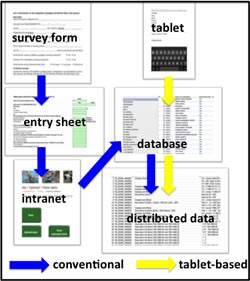 |
Learning plays a central role in N2Africa. The success of our dissemination approaches depends on the ability to determine what works, where how and for whom and to adapt activities accordingly. Key to this process of learning, is a system of data collection, management and delivery that ensures that data is captured from the field and converted into an accessible form as quickly and accurately as possible. N2Africa has worked hard to establish such a system and we are happy to report on recent progress and future plans for improvement.
Our data flows are organized in the following way: our partners use paper survey forms to collect data from the field. ...
Figure: Current and tablet-based data flows
|
|
2 |
| Options for climbing bean cultivation in Uganda – A detailed farm characterization |
|
Climbing bean can be an important crop for sustainable intensification of cropping systems in the densely populated highlands of eastern Africa. With a potential yield that is approximately two times higher than for bush bean, climbing beans provide an excellent opportunity to enhance bean yields in areas where land is constrained. ...
Photo: Climbing bean intercropped in banana-coffee fields
|
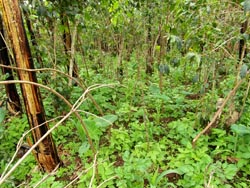 |
|
3 |
| Cowpea fritters a new delicacy with N2Africa farmers in Zimbabwe |
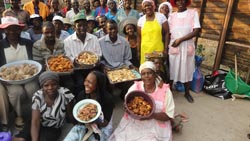 |
Through N2Africa, farmers in Zimbabwe have perfected the agronomy of grain legumes, and they are now perfecting their grain legumes processing skills. Over the years, the N2Africa team in Zimbabwe has worked with farming communities to perfect the art of processing soyabean into different nutritious products.
Photo: Men and women participate in N2Africa nutrition activities
|
|
4 |
| Agriculture Field day exposes flaws and solutions |
| Malawi faces a decrease of 27% in maize yield this season compared with last year. The recent Agricultural field day held at LUANAR Natural Resources College organized by the African Institute for Corporate Citizenship (AICC) and attended by different agricultural organizations and students has shown that some fields yielded well, despite the floods and the dry spells that have characterized this growing season and that will have good harvest. |
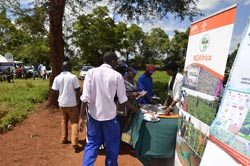 |
|
5 |
| N2Africa interventions that improve agricultural productivity in Malawi |
 |
In Malawi, N2Africa is working to resolve some of the issues through engaging farmers in trainings and capacity building, field demonstrations and sensitization on new technologies such as the use of rhizobial inoculant. N2Africa is collaborating with Kasungu District Agriculture Development Office (DADO) and Churches Action in Relief and Development (CARD) to ... |
|
6 |
| Expanding soyabean cultivation to Zambezi Valley in Mozambique |
|
N2Africa, in collaboration with its partner in the soyabean value chain iDE (International Development Enterprises), is testing the adaptability of five promiscuous soyabean varieties (earlier, medium and later maturing) for the first time in the Zambezi Valley, a non-traditional soyabean area. The Zambezi Valley ...
Photo: Participants at field day observing different soyabean varieties growing in Caia District
|
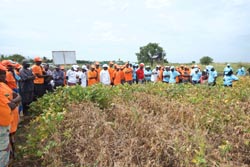 |
|
7 |
| Visit to Southern Highlands of Tanzania to strengthen partnership and explore areas of collaboration among soyabean value chain actors |
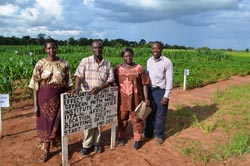 |
Linkages among soyabean value chain actors in Tanzania are weak and coordination between participants and enterprises seem to be a totally alien concept. For over one year now, N2Africa and CRS led - Soya ni Pesa project (SnP) have been working to foster partnerships in soyabean value chain development. As meaningful partnership starts to develop, ...
Photo: A long term experiment in Songea District that examines the long-term rotational effects on soyabean
|
|
8 |
| Improved Early Education N2Africa Style |
|
BNF outreach in west Kenya now includes working through local primary schools to install simple legume technology demonstrations and hold low cost farmer field days around them. This move was spontaneous, ...
Photo: Dick Morgan Ongai of the MFAGRO farmer organization in Vihiga with students of Munugi Primary School
|
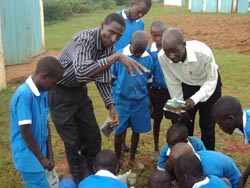 |
|
9 |
| Hannah Boughton – a student studying for an MSc in Environmental Studies, Antioch University, New Hampshire, USA wrote to us “The N2Africa program was a great inspiration for me… |
Today’s high school students have a myriad of things clamoring for their attention, many of which are far more interesting to them than their average classroom period. In light of this I wanted to create a science unit that was novel and meaningful to keep them engaged in learning topics from food chains to carbon cycling. I also had a broader goal of creating a learning environment that would lay the foundation for students to develop and practice the skills and knowledge necessary to become responsible global citizens. ...
|
10 |
| MOOC Summercourse |
In January-March there was the possiblity to follow the Wageningen MOOC (Massive Online Open Course) on "Growing our future food: crops" via edX. This succesfull six weeks course, that brings you knowlegde to understand and quantify the basic agricultural proceses, will also be offered as Summer Course. Part of the course material is filmed at N2Africa locations. The start date for this course will be June 15th and access will be available until September 25th. To follow this course you need to subscribe to edX, where the course will be announced very soon. Updates will also be published on the N2Africa website.
|
11 |
| N2Africa in the news |
Please see http://www.scidev.net/global/food-security/news/beans-africa-fertiliser-farming.html for a news report.
Although I always argue that benefits from nitrogen fixation should be seen as an additional source of N rather than a substitute, journalists seem to prefer to state the alternative!
Ken Giller
|
12 |
| Reports uploaded on the N2Africa website |
Andrew Farrow wrote, with support of the country coordinators of the Core Countries, a background report pointing out the action areas for Ethiopia, Ghana, Nigeria, Tanzania and Uganda in 2014.
A compact report with condensed information on the project progress made in Year 1 of Phase II has been uploaded on our website.
An MSc internship report on "Adoption constraints with climbing beans in Kashambua subcounty, Uganda" by Bharathwaj Shridhar.
|
13 |
| ADVANCE II Newsletter |
ADVANCE, a partner for N2Africa in northern Ghana, sent us the March edition of their ADVANCE II Newsletter. In this issue, they share news of how a nucleus farmer is supporting female smallholder farmers increase yield and income, how women in agriculture were celebrated on the International Women’s Day, some field stories and many more.
|
15 |
| IFDC training program “Linking Farmers to Markets in Africa" |
IFDC organizes courses, among others this one on linking farmers to markets, that will take place in Nairobi from July 20-24, 2015 and conducts in English. (previous versions were in English and French.
|
16 |
| Legume Perspectives issue 6 |
From The Editorial Board of Legume Perspectives, the journal of the International Legume Society (ILS), we received a link to the issue 6 of Legume Perspectives that has been published in March. Please download it from their journal web page, together with previous issues.
You are also welcome to visit the archives of Grain Legumes, the predecessor of legume perspectives.
|
17 |










